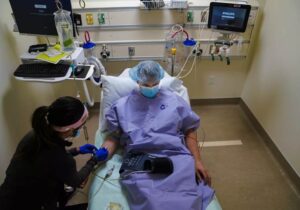Receiving medical test results for a serious illness is like a sucker punch. Illness rattles perceptions of self and identity, forever. Patients describe feeling “overwhelmed,” emotionally overloaded, at the time of diagnosis. According to patients, having someone there when getting medical test results, is invaluable.
Physicians differ in their skill and approach to sharing significant medical test results. And patients differ with how they hear, interpret, and absorb this information. It is an emotionally laden exchange, packed with opportunities both realized as well as missed.
When Getting Medical Test Results, Bring Someone With You
During interviews about the patient experience, people mention how valuable it was to have someone with them when meeting with the doctor and getting test results. This feedback surfaced during many interviews conducted to examine the role of advocacy and support. The value of having someone in the room is not just for emotional support, but to help process the information, and to assist with questions.
Sinead, a breast cancer survivor understood the importance of this role. When a friend asked, she was willing to take on this role. As she knew from experience, “When you’re getting so much information, you need a partner there who’s going to listen and take notes and say, okay, this is the next step.” Learning how to ask for help, as well as how to accept support, are important skills to adopt during times of illness.
Consequences of Going Alone
Jackie would learn from her own experience the value of bringing someone with her when meeting with the physician. The appointment was to follow-up on biopsy results after a diagnostic mammogram showed some architectural distortion. Previous abnormal test results had turned out to be micro calcifications, benign, so Jackie fully expected a similar report.
Jackie scheduled the appointment so that she could stop by on her way home from work. This time, however, the biopsy came back positive for cancer. The radiologist did not mince words in telling Jackie the diagnosis. She was handed a big book on breast cancer, and the next thing she knew she was talking with a surgeon, getting registered as a new patient, and being asked if she would like a breast lift with her reconstructive surgery.
You’re just shocked, stunned. And again, I had been working all day. I didn’t even think of bringing someone with me. And I look back now, and I really, really wish I had. You know? I mean, for God’s sake, I had a biopsy…I should have had someone to just be with me because I really, I didn’t know what to think.
Jackie
The medical test results from the biopsy suggested the cancer was small, non-aggressive, so the recommended next step for Jackie was a lumpectomy rather than a mastectomy. Believing that her diagnosis was relatively straightforward, Jackie arrived alone to learn results from the surgery.
However, these test results indicated the tumor was bigger than anticipated, and three of the sentinel nodes tested positive for cancer. It was a very emotional meeting because her cancer was now at a Stage III-A, rather than a Stage I. She would need not only another surgery but most likely both chemotherapy and radiation.
When Jackie went for the results from her second surgery, this time she brought a friend. “I was very grateful for my friend because all of a sudden things at that point just started to not look really good. I really started to worry.”
5 Ways an Advocate Can Help
A serious illness is a journey, requiring many kinds of support at various points along the way. A diagnosis is just the beginning, so be sure to bring someone with you to help absorb the information and identify next steps. Here are five ways that having someone with you can be beneficial during visits with physicians, particularly when reviewing medical test results:
- Brainstorm before the visit to identify questions.
- Take notes during the meeting.
- Prompt you during the meeting, if needed, on items to ask/discuss with doctor.
- De-brief after meeting with the doctor.
- Identify next steps to take.
If you don’t have someone who can join you for the doctor’s appointment, use these same points to advocate for yourself more effectively. When meeting with a doctor alone — think of questions ahead of time, write them down, take notes during the meeting, ask for clarifications, and ask the doctor to identify the next steps (which you will write down!)
*Quotes in this post are from interviews conducted for my book, Navigating Illness: The Patient Experience, a work in progress. Names were changed upon an individual’s request.




One comment on “Getting Medical Test Results? Bring Someone With You”
Hi, this is a comment.
To get started with moderating, editing, and deleting comments, please visit the Comments screen in the dashboard.
Commenter avatars come from Gravatar.